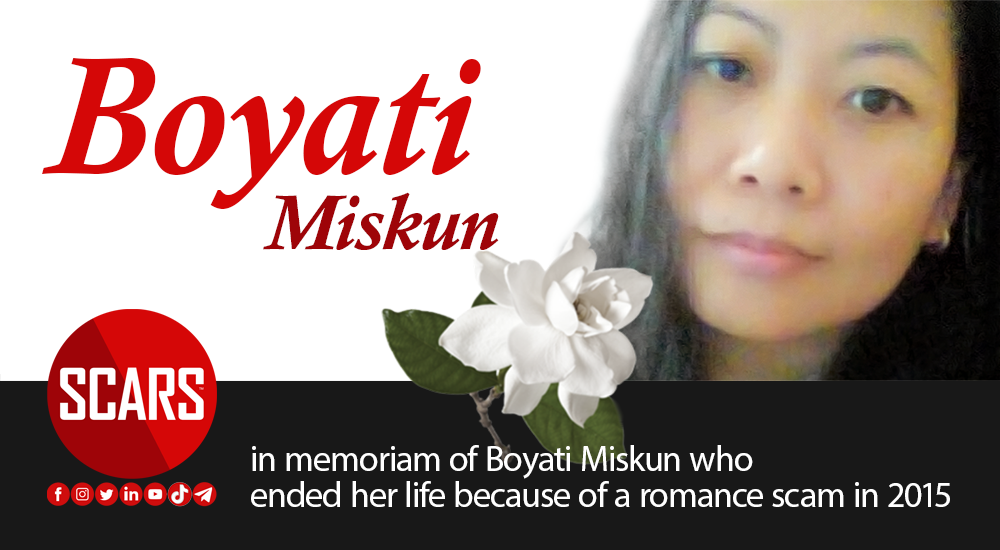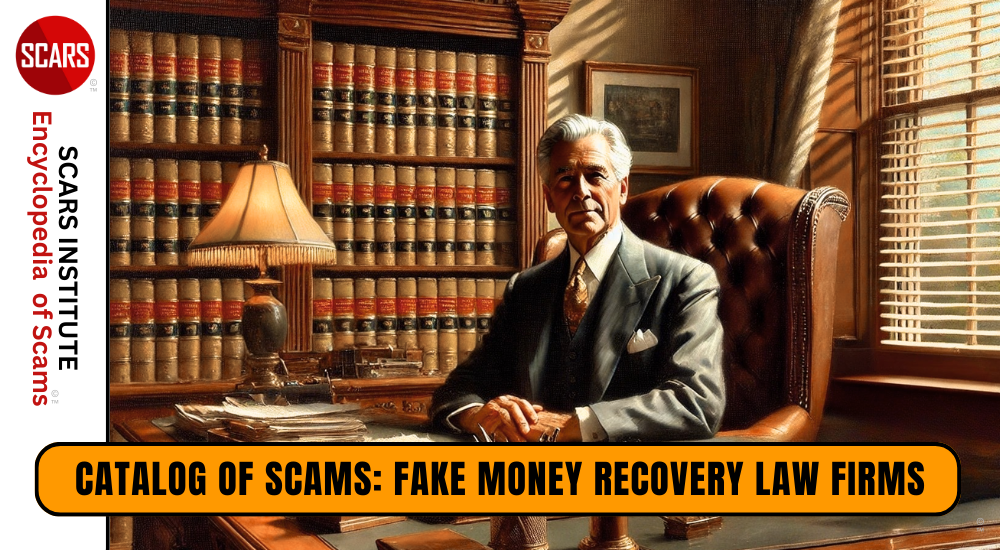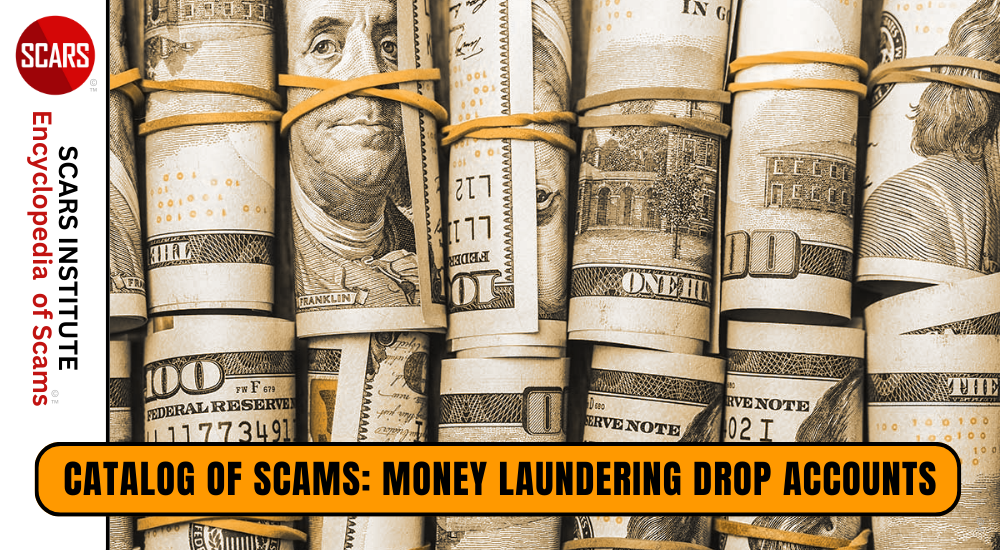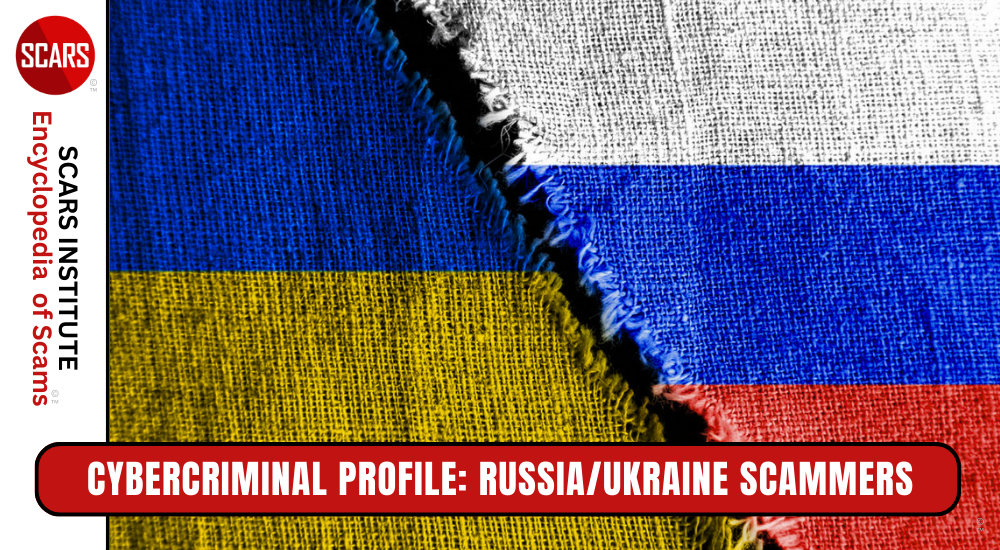
SCARS Institute’s Encyclopedia of Scams™ Published Continuously for 25 Years

Don’t Fall Victim To Fraudulent Investment Opportunities
Portions courtesy of ActionFraud
Investment scams can be hard to spot. Every year, victims lose thousands of pounds to criminals imitating genuine investment firms by clicking on adverts that lead them to fraudulent websites designed to replicate the page of a real investment firm. These imitation websites are known as “cloned companies”.
We are working with the National Economic Crime Centre to warn the public about the increasing number of bogus investment websites, as new figures reveal:
- In the first six months of 2021, £36.2m was lost to ‘cloned company’ investment scams.
- In the first six months of 2021, 1,100 reports were received, equating to an average loss of £47,000 per victim, when investing money in cloned companies.
- Numbers for the United States are not available.
What is a cloned company? And how do they target your savings?
They are set up by fraudsters using the name, address, and use the registrations numbers of real companies authorized by the country to conduct these types of businesses.
Fraudsters may misappropriate the name, address, registration number, logo, photo, or website likeness of a currently or previously registered firm or investment professional. They try to trick investors into believing that they are registered by using a number of tactics, including the following:
- “Spoofed Websites.” Fraudsters may set up websites using URL addresses or names similar to those of registered firms or investment professionals to trick investors into believing that the fraudsters are registered or that the fraudsters are affiliated with a registered firm or investment professional.
- Fake Profiles on Social Media. Fraudsters may set up profiles impersonating registered investment professionals on popular social media platforms and then message investors to solicit their money.
- Cold Calling. Fraudsters may set up boiler rooms with teams of people cold calling investors to solicit their money while claiming to be employees of registered firms. The fraudsters may use technology to make it appear they are calling from the firm’s location.
- Misrepresenting or Falsifying Documents. Fraudsters may recruit investors by misrepresenting that their firm was registered with the SEC, including pointing to the firm’s Form D filings to support the misrepresentation (to learn more, read this OIEA Investor Alert). Fraudsters may solicit investors by impersonating a registered investment professional and generating a fake version of a public report using the professional’s name and CRD number (to learn more, read this FINRA Investor Alert).
Registrations
- U.S. clone companies: Fraudsters may falsely claim to be registered with the Securities and Exchange Commission (SEC), the Financial Industry Regulatory Authority (FINRA) or a state securities regulator in order to lure investors into scams, or even impersonate real investment professionals who actually are registered with these organizations.
- UK Clone Companies: They are set up by fraudsters using the name, address, and ‘Firm Reference Number’ (FRN) of real companies authorized by the Financial Conduct Authority (FCA).
- Other Countries: they will be likewise stealing the information from real companies in those countries, along with their registration information. But always check for their registration and the legal address and contact information to compare it with what is in front of you.
Registration of Investment Professionals
Many sellers of investment products or services in the U.S. are either brokers, investment advisers, or both. Most brokers must register with the SEC and join FINRA. Investment advisers that provide investment advice to retail investors generally must register with the SEC or the state securities regulator where they have their principal place of business.
To quickly and easily check if someone offering you an investment is currently licensed or registered, use the search tool on Investor.gov. Once you confirm that the seller is licensed or registered, make sure you are not dealing with an imposter. Contact the seller using the contact information you verify independently – for example, by using a phone number or website listed in the firm’s Client Relationship Summary (Form CRS) – rather than relying on contact information the seller provides you. To ensure you are looking at a genuine copy of the firm’s Form CRS, follow these steps:
- In the “Check Out Your INVESTMENT PROFESSIONAL” search box on Investor.gov, select “Firm” from the drop-down options and type in the name of the firm.
- In the search results, click on the relevant firm and then click on “Get Details.”
- Click on “Relationship Summary” or “Part 3 Relationship Summary.”
For additional information about Form CRS, visit investor.gov/CRS.
Remember, that each country has different laws and registration requirements. When in doubt contact your country’s securities and investment regulatory body.
Do your homework and do not rush it! Scammers know how to apply the pressure so you will not verify them!
The criminals running these scams engage with victims through a number of channels.
Often they take out adverts on social media platforms and search engines designed to attract people to click on them by highlighting enticing offers of high returns. The returns being promised by these criminal gangs are often modest so as not to arouse suspicion, but slightly better than the market rate, therefore appealing to those looking for long-term, ‘safe’ investments.
Once a person clicks on the advert they are taken to an exact replica of a website belonging to a legitimate investment firm. The most sophisticated criminals will even clone the website domain name (i.e. the unique address registered to that site). Once victims have registered their interest, they’ll be contacted by the offenders, who often obtain the names of genuine employees at investment firms and create seemingly legitimate company email addresses, but with very subtle changes such as one substituted letter.
There have also been instances of investors inputting their contact details into popular price comparison websites and then being phoned by criminals claiming to be from a well-known, legitimate investment firm. Another tactic used by these criminals to target investors involves sending victims sales materials linking to websites of legitimate firms.
Eventually, given false confidence by the various tactics used by cloned company scammers, victims will end up transferring their savings directly to criminal gangs under the false belief that they are sending them to a legitimate investment firm. Often, victims will not realize that they’ve been scammed until months later, when they fail to receive quarterly returns or investment reports.
Watch Out for Red Flags
Regardless of whether someone claims to be registered with the SEC, beware if you spot these warning signs of an investment scam:
- Guaranteed High Investment Returns. Promises of high investment returns – often accompanied by a guarantee of little or no risk – are a classic sign of fraud. Every investment has risk, and the potential for high returns usually comes with high risk.
- Unsolicited Offers. Unsolicited offers (you didn’t ask for it and don’t know the sender) to earn investment returns that seem “too good to be true” may be part of a scam.
- Red flags in Payment Methods for Investments.
- Credit Cards. Most licensed and registered investment firms do not allow their customers to use credit cards to invest.
- Digital Asset Wallets and “Cryptocurrencies.” Licensed and registered financial firms typically do not require their customers to use digital asset wallets or digital assets, including so-called “cryptocurrencies,” to invest.
- Wire Transfers and Checks. If you pay for investment by wire transfer or check, be suspicious if you’re being asked to send or to make the payment out to a person or to a different firm, the address is suspicious (for example, an online search for the address suggests it is not an office building where the firm operates), or you are told to note that the payment is for a purpose unrelated to the investment (for example, medical expenses or a loan to a family member). If you wire money outside of the United States for an investment that turns out to be a scam, you likely will never see your money again.
How to protect yourself
- Reject unsolicited investment offers whether made online, on social media or over the phone. Be cautious when dealing with large sums of money, even if you initiated the first contact.
- Always check the Corporations registry for your country, state or province. In the UK it is the FCA Register to confirm the contact details provided to you by the firm. If the website, email, and telephone number don’t match, don’t invest. Look out for subtle differences such as letters replaced with numbers (e.g. S and 5, O and 0), additional words or spelling errors. Make sure you’re dealing with an authorised form, but remember these are public registers which fraudsters can also take information from to sound legitimate.
- Check the FCA Warning List of firms to avoid.
- If you have visited a website, you think is suspicious, report it to the National Cyber Security Centre, using their quick and easy referral tool.
- Consider seeking impartial advice before investing.
Reporting These Scams
Worldwide: you can report all of these scams to the U.S. Federal Trade Commission and they will distribute these reports as needed. Use this link for increased visibility and attention https://reportfraud.ftc.gov/#/?orgcode=SCARS
In the United States: Report possible securities fraud to the SEC at www.sec.gov/tcr. Report online fraud to the FBI’s Internet Crime Complaint Center at https://www.ic3.gov. The SEC maintains a list of Impersonators of Genuine Firms. This list is not exhaustive – firms may be impersonated even if they are not on the list. FINRA staff issued an article about imposter schemes.
In the United Kingdom: If you think you’ve fallen victim to an investment fraud, report it to Action Fraud as soon as possible online at http://www.actionfraud.police.uk or by calling 0300 123 2040.
More Information
More information about online frauds and investment scams can be found at www.fbi.gov or Investor.gov, the SEC’s website for individual investors.
You can contact the SEC’s Office of Investor Education and Advocacy (OIEA) by phone at 1-800-732-0330, using this online form, or via email at Help@SEC.gov.
Receive Investor Alerts and Bulletins from OIEA by email or RSS feed. Follow OIEA on Twitter @SEC_Investor_Ed. Like OIEA on Facebook at facebook.com/secinvestoreducation.
Are you a pensioner in the U.K. looking to invest your pension or lump sum early? Please see our dedicated pension fraud advice page on how to protect yourself from pension fraud.
-/ 30 /-
What do you think about this?
Please share your thoughts in a comment below!
Table of Contents
LEAVE A COMMENT?
Recent Comments
On Other Articles
- SCARS Institute Editorial Team on Reporting Scams & Interacting With The Police – A Scam Victim’s Checklist [VIDEO]: “Yes, this is a scam. For your own sanity, just block them completely.” Feb 25, 15:37
- on Danielle Delaunay/Danielle Genevieve – Stolen Identity/Stolen Photos – Impersonation Victim UPDATED 2024: “She goes by the name of Sanrda John now” Feb 25, 10:26
- on Reporting Scams & Interacting With The Police – A Scam Victim’s Checklist [VIDEO]: “So far I have not been scam out of any money because I was aware not to give the money…” Feb 25, 07:46
- on Love Bombing And How Romance Scam Victims Are Forced To Feel: “I was love bombed to the point that I would do just about anything for the scammer(s). I was told…” Feb 11, 14:24
- on Dani Daniels (Kira Lee Orsag): Another Scammer’s Favorite: “You provide a valuable service! I wish more people knew about it!” Feb 10, 15:05
- on Danielle Delaunay/Danielle Genevieve – Stolen Identity/Stolen Photos – Impersonation Victim UPDATED 2024: “We highly recommend that you simply turn away form the scam and scammers, and focus on the development of a…” Feb 4, 19:47
- on The Art Of Deception: The Fundamental Principals Of Successful Deceptions – 2024: “I experienced many of the deceptive tactics that romance scammers use. I was told various stories of hardship and why…” Feb 4, 15:27
- on Danielle Delaunay/Danielle Genevieve – Stolen Identity/Stolen Photos – Impersonation Victim UPDATED 2024: “Yes, I’m in that exact situation also. “Danielle” has seriously scammed me for 3 years now. “She” (he) doesn’t know…” Feb 4, 14:58
- on An Essay on Justice and Money Recovery – 2026: “you are so right I accidentally clicked on online justice I signed an agreement for 12k upfront but cd only…” Feb 3, 08:16
- on The SCARS Institute Top 50 Celebrity Impersonation Scams – 2025: “Quora has had visits from scammers pretending to be Keanu Reeves and Paul McCartney in 2025 and 2026.” Jan 27, 17:45
ARTICLE META
Important Information for New Scam Victims
- Please visit www.ScamVictimsSupport.org – a SCARS Website for New Scam Victims & Sextortion Victims
- Enroll in FREE SCARS Scam Survivor’s School now at www.SCARSeducation.org
- Please visit www.ScamPsychology.org – to more fully understand the psychological concepts involved in scams and scam victim recovery
If you are looking for local trauma counselors please visit counseling.AgainstScams.org or join SCARS for our counseling/therapy benefit: membership.AgainstScams.org
If you need to speak with someone now, you can dial 988 or find phone numbers for crisis hotlines all around the world here: www.opencounseling.com/suicide-hotlines
A Note About Labeling!
We often use the term ‘scam victim’ in our articles, but this is a convenience to help those searching for information in search engines like Google. It is just a convenience and has no deeper meaning. If you have come through such an experience, YOU are a Survivor! It was not your fault. You are not alone! Axios!
A Question of Trust
At the SCARS Institute, we invite you to do your own research on the topics we speak about and publish, Our team investigates the subject being discussed, especially when it comes to understanding the scam victims-survivors experience. You can do Google searches but in many cases, you will have to wade through scientific papers and studies. However, remember that biases and perspectives matter and influence the outcome. Regardless, we encourage you to explore these topics as thoroughly as you can for your own awareness.
Statement About Victim Blaming
SCARS Institute articles examine different aspects of the scam victim experience, as well as those who may have been secondary victims. This work focuses on understanding victimization through the science of victimology, including common psychological and behavioral responses. The purpose is to help victims and survivors understand why these crimes occurred, reduce shame and self-blame, strengthen recovery programs and victim opportunities, and lower the risk of future victimization.
At times, these discussions may sound uncomfortable, overwhelming, or may be mistaken for blame. They are not. Scam victims are never blamed. Our goal is to explain the mechanisms of deception and the human responses that scammers exploit, and the processes that occur after the scam ends, so victims can better understand what happened to them and why it felt convincing at the time, and what the path looks like going forward.
Articles that address the psychology, neurology, physiology, and other characteristics of scams and the victim experience recognize that all people share cognitive and emotional traits that can be manipulated under the right conditions. These characteristics are not flaws. They are normal human functions that criminals deliberately exploit. Victims typically have little awareness of these mechanisms while a scam is unfolding and a very limited ability to control them. Awareness often comes only after the harm has occurred.
By explaining these processes, these articles help victims make sense of their experiences, understand common post-scam reactions, and identify ways to protect themselves moving forward. This knowledge supports recovery by replacing confusion and self-blame with clarity, context, and self-compassion.
Additional educational material on these topics is available at ScamPsychology.org – ScamsNOW.com and other SCARS Institute websites.
Psychology Disclaimer:
All articles about psychology and the human brain on this website are for information & education only
The information provided in this article is intended for educational and self-help purposes only and should not be construed as a substitute for professional therapy or counseling.
While any self-help techniques outlined herein may be beneficial for scam victims seeking to recover from their experience and move towards recovery, it is important to consult with a qualified mental health professional before initiating any course of action. Each individual’s experience and needs are unique, and what works for one person may not be suitable for another.
Additionally, any approach may not be appropriate for individuals with certain pre-existing mental health conditions or trauma histories. It is advisable to seek guidance from a licensed therapist or counselor who can provide personalized support, guidance, and treatment tailored to your specific needs.
If you are experiencing significant distress or emotional difficulties related to a scam or other traumatic event, please consult your doctor or mental health provider for appropriate care and support.
Also read our SCARS Institute Statement about Professional Care for Scam Victims – click here to go to our ScamsNOW.com website.
















Thank you for your comment. You may receive an email to follow up. We never share your data with marketers.